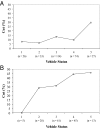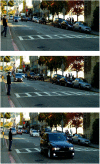Higher social class predicts increased unethical behavior - PubMed (original) (raw)
Higher social class predicts increased unethical behavior
Paul K Piff et al. Proc Natl Acad Sci U S A. 2012.
Erratum in
- Correction for Piff et al., Higher social class predicts increased unethical behavior.
[No authors listed] [No authors listed] Proc Natl Acad Sci U S A. 2017 Oct 24;114(43):E9181. doi: 10.1073/pnas.1716910114. Epub 2017 Oct 16. Proc Natl Acad Sci U S A. 2017. PMID: 29073115 Free PMC article. No abstract available.
Abstract
Seven studies using experimental and naturalistic methods reveal that upper-class individuals behave more unethically than lower-class individuals. In studies 1 and 2, upper-class individuals were more likely to break the law while driving, relative to lower-class individuals. In follow-up laboratory studies, upper-class individuals were more likely to exhibit unethical decision-making tendencies (study 3), take valued goods from others (study 4), lie in a negotiation (study 5), cheat to increase their chances of winning a prize (study 6), and endorse unethical behavior at work (study 7) than were lower-class individuals. Mediator and moderator data demonstrated that upper-class individuals' unethical tendencies are accounted for, in part, by their more favorable attitudes toward greed.
Conflict of interest statement
The authors declare no conflict of interest.
Figures
Fig. 1.
Percentage of cars that cut off (i) other vehicles at the four-way intersection (from study 1) (A) or (ii) the pedestrian at the crosswalk (from study 2) (B), as a function of vehicle status (1 = lowest status, 5 = highest status).
Fig. 2.
The relationship between social class and propensity for unethical behavior, moderated by the greed-is-good prime (from study 7).
Fig. 3.
Aerial view of four-way intersection (from study 1). White arrows depict highways used by coders to code driver behavior at the intersection (image courtesy of © 2011 Google Maps).
Fig. 4.
Photo series depicting crosswalk from study 2 with confederate posing as a pedestrian approaching (Top) and standing at crosswalk (Middle) as target vehicle fails to yield (Bottom).
Comment in
- Evidence that publication bias contaminated studies relating social class and unethical behavior.
Francis G. Francis G. Proc Natl Acad Sci U S A. 2012 Jun 19;109(25):E1587; author reply E1588. doi: 10.1073/pnas.1203591109. Epub 2012 May 21. Proc Natl Acad Sci U S A. 2012. PMID: 22615347 Free PMC article. No abstract available.
Similar articles
- Social class, power, and selfishness: when and why upper and lower class individuals behave unethically.
Dubois D, Rucker DD, Galinsky AD. Dubois D, et al. J Pers Soc Psychol. 2015 Mar;108(3):436-49. doi: 10.1037/pspi0000008. Epub 2015 Jan 26. J Pers Soc Psychol. 2015. PMID: 25621858 - A 4-study replication of the moderating effects of greed on socioeconomic status and unethical behaviour.
Balakrishnan A, Palma PA, Patenaude J, Campbell L. Balakrishnan A, et al. Sci Data. 2017 Jan 31;4:160120. doi: 10.1038/sdata.2016.120. Sci Data. 2017. PMID: 28140396 Free PMC article. - Cheating in the name of others: Offering prosocial justifications promotes unethical behavior in young children.
Zhao L, Heyman GD, Chen L, Sun W, Zhang R, Lee K. Zhao L, et al. J Exp Child Psychol. 2019 Jan;177:187-196. doi: 10.1016/j.jecp.2018.08.006. Epub 2018 Sep 11. J Exp Child Psychol. 2019. PMID: 30216777 - Social status and unethical behavior: Two replications of the field studies in Piff et al. (2012).
Jung MH, Smeets P, Stoop J, Vosgerau J. Jung MH, et al. J Exp Psychol Gen. 2023 May;152(5):1368-1378. doi: 10.1037/xge0001333. Epub 2023 Jan 5. J Exp Psychol Gen. 2023. PMID: 36603114 Review. - Social class and prosocial behavior: current evidence, caveats, and questions.
Piff PK, Robinson AR. Piff PK, et al. Curr Opin Psychol. 2017 Dec;18:6-10. doi: 10.1016/j.copsyc.2017.06.003. Epub 2017 Jun 10. Curr Opin Psychol. 2017. PMID: 29221512 Review.
Cited by
- Increased sensitivity to social hierarchy during social competition versus cooperation.
Su Y, Martens S, Aleman A, Zhou J, Xu P, Luo YJ, S Goerlich K. Su Y, et al. Soc Cogn Affect Neurosci. 2024 Oct 7;19(1):nsae060. doi: 10.1093/scan/nsae060. Soc Cogn Affect Neurosci. 2024. PMID: 39252588 Free PMC article. - Social class and moral judgment: a process dissociation perspective.
Tutic A, Haiser F, Krumpal I. Tutic A, et al. Front Sociol. 2024 Apr 30;9:1391214. doi: 10.3389/fsoc.2024.1391214. eCollection 2024. Front Sociol. 2024. PMID: 38745822 Free PMC article. - When are people more open to cheating? Economic inequality makes people expect more everyday unethical behavior.
Schmalor A, Schroeder AK, Heine SJ. Schmalor A, et al. PLoS One. 2024 Feb 21;19(2):e0294124. doi: 10.1371/journal.pone.0294124. eCollection 2024. PLoS One. 2024. PMID: 38381751 Free PMC article. - Time trends and modifiable factors of COVID-19 contact tracing coverage, Geneva, Switzerland, June 2020 to February 2022.
Mongin D, Bürgisser N; Covid-SMC Study Group; Courvoisier DS. Mongin D, et al. Euro Surveill. 2024 Jan;29(3):2300228. doi: 10.2807/1560-7917.ES.2024.29.3.2300228. Euro Surveill. 2024. PMID: 38240059 Free PMC article. - The developmental trends of parental self-efficacy and adolescents' rule-breaking behaviors in the Italian context: A 7-wave latent growth curve study.
Remondi C, Gerbino M, Zuffianò A, Pastorelli C, Thartori E, Bacchini D, Di Giunta L, Lunetti C, Favini A, Lansford JE, Dodge KA. Remondi C, et al. PLoS One. 2023 Nov 15;18(11):e0293911. doi: 10.1371/journal.pone.0293911. eCollection 2023. PLoS One. 2023. PMID: 37967059 Free PMC article.
References
- Gino F, Pierce L. The abundance effect: Unethical behavior in the presence of wealth. Organ Behav Hum Dec. 2009;109:142–155.
- Adler NE, Epel ES, Castellazzo G, Ickovics JR. Relationship of subjective and objective social status with psychological and physiological functioning: Preliminary data in healthy white women. Health Psychol. 2000;19:586–592. - PubMed
- Kraus MW, Piff PK, Keltner D. Social class as culture: The convergence of resources and rank in the social realm. Curr Dir Psychol Sci. 2011;20:246–250.
- Kraus MW, Piff PK, Keltner D. Social class, sense of control, and social explanation. J Pers Soc Psychol. 2009;97:992–1004. - PubMed
- Kraus MW, Côté S, Keltner D. Social class, contextualism, and empathic accuracy. Psychol Sci. 2010;21:1716–1723. - PubMed
Publication types
MeSH terms
LinkOut - more resources
Full Text Sources



